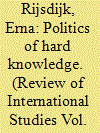| Srl | Item |
| 1 |
ID:
168877


|
|
|
|
|
| Summary/Abstract |
After a genocide, leaders compete to fill the postwar power vacuum and establish their preferred story of the past. Memorialisation, including through building memorials, provides a cornerstone of political power. The dominant public narrative determines the plotline; it labels victims and perpetrators, interprets history, assigns meaning to suffering, and sets the post-atrocity political agenda. Therefore, ownership of the past, in terms of the public account, is deeply contested. Although many factors affect the emergence of a dominant atrocity narrative, this article highlights the role of international interactions with genocide memorials, particularly how Western visitors, funders, and consultants influence the government's narrative. Western consumption of memorials often reinforces aspects of dark tourism that dehumanise victims and discourage adequate context for the uninformed visitor. Funding and consultation provided by Western states and organisations – while offering distinct benefits – tends to encourage a homogenised atrocity narrative, which reflects the values of the global human rights regime and existing standards of memorial design rather than privileging the local particularities of the atrocity experience. As shown in the cases of Rwanda, Cambodia, and Bosnia, Western involvement in public memory projects often strengthens the power of government narratives, which control the present by controlling the past.
|
|
|
|
|
|
|
|
|
|
|
|
|
|
|
|
| 2 |
ID:
108494


|
|
|
|
|
| Publication |
2011.
|
| Summary/Abstract |
Questions of uncertainty and responsibility have been central to the political and legal investigations of the failed UN/Dutch peacekeeping mission in Srebrenica. The official Dutch NIOD report on the peacekeeping mission has reconstructed the fall of Srebrenica as a surprise attack and as an 'intelligence failure'. The report and its understanding of tactical uncertainty has led to a call for more intelligence in UN operations. I argue that the report builds its claims on a problematic epistemology of intelligence studies drawing upon a politics of 'hard knowledge'. A similar epistemology can be identified in the proceedings of the war crimes tribunal in The Hague (ICTY) in the legal approach of criminal intent for the violence in Srebrenica. Although it is recognised that the political responsibility to prevent genocide and the juridical responsibility to punish those who have committed crimes have different implications for what can be called relevant foreknowledge or criminal intent, both the juridical and the political approaches close off paths for the mobilisation of histories that are more sensitive to the productive workings of language and images and thus to their bearing on possible futures.
|
|
|
|
|
|
|
|
|
|
|
|
|
|
|
|